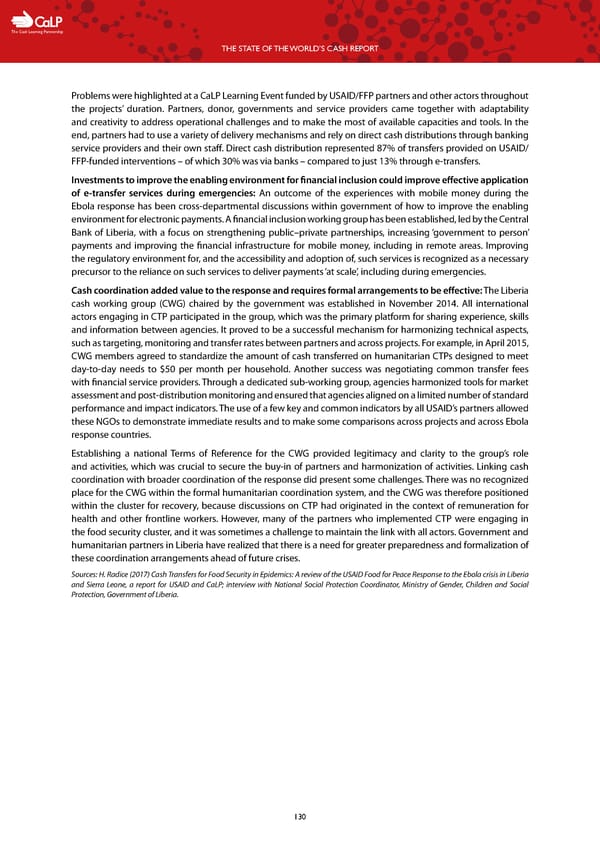C The Cash Learning Partnership THE STATE OF THE WORLD’S CASH REPORT Problems were highlighted at a CaLP Learning Event funded by USAID/FFP partners and other actors throughout the projects’ duration. Partners, donor, governments and service providers came together with adaptability and creativity to address operational challenges and to make the most of available capacities and tools. In the end, partners had to use a variety of delivery mechanisms and rely on direct cash distributions through banking service providers and their own staff. Direct cash distribution represented 87% of transfers provided on USAID/ FFP-funded interventions – of which 30% was via banks – compared to just 13% through e-transfers. Investments to improve the enabling environment for financial inclusion could improve effective application of e-transfer services during emergencies: An outcome of the experiences with mobile money during the Ebola response has been cross-departmental discussions within government of how to improve the enabling environment for electronic payments. A financial inclusion working group has been established, led by the Central Bank of Liberia, with a focus on strengthening public–private partnerships, increasing ‘government to person’ payments and improving the financial infrastructure for mobile money, including in remote areas. Improving the regulatory environment for, and the accessibility and adoption of, such services is recognized as a necessary precursor to the reliance on such services to deliver payments ‘at scale’, including during emergencies. Cash coordination added value to the response and requires formal arrangements to be effective: The Liberia cash working group (CWG) chaired by the government was established in November 2014. All international actors engaging in CTP participated in the group, which was the primary platform for sharing experience, skills and information between agencies. It proved to be a successful mechanism for harmonizing technical aspects, such as targeting, monitoring and transfer rates between partners and across projects. For example, in April 2015, CWG members agreed to standardize the amount of cash transferred on humanitarian CTPs designed to meet day-to-day needs to $50 per month per household. Another success was negotiating common transfer fees with financial service providers. Through a dedicated sub-working group, agencies harmonized tools for market assessment and post-distribution monitoring and ensured that agencies aligned on a limited number of standard performance and impact indicators. The use of a few key and common indicators by all USAID’s partners allowed these NGOs to demonstrate immediate results and to make some comparisons across projects and across Ebola response countries. Establishing a national Terms of Reference for the CWG provided legitimacy and clarity to the group’s role and activities, which was crucial to secure the buy-in of partners and harmonization of activities. Linking cash coordination with broader coordination of the response did present some challenges. There was no recognized place for the CWG within the formal humanitarian coordination system, and the CWG was therefore positioned within the cluster for recovery, because discussions on CTP had originated in the context of remuneration for health and other frontline workers. However, many of the partners who implemented CTP were engaging in the food security cluster, and it was sometimes a challenge to maintain the link with all actors. Government and humanitarian partners in Liberia have realized that there is a need for greater preparedness and formalization of these coordination arrangements ahead of future crises. Sources: H. Radice (2017) Cash Transfers for Food Security in Epidemics: A review of the USAID Food for Peace Response to the Ebola crisis in Liberia and Sierra Leone, a report for USAID and CaLP; interview with National Social Protection Coordinator, Ministry of Gender, Children and Social Protection, Government of Liberia. 130
 The State of the World's Cash | Full Report Page 131 Page 133
The State of the World's Cash | Full Report Page 131 Page 133